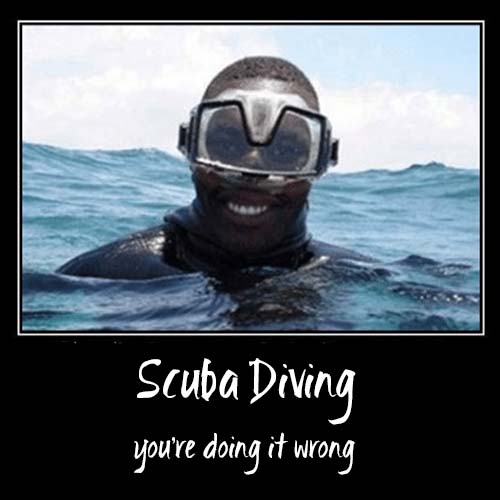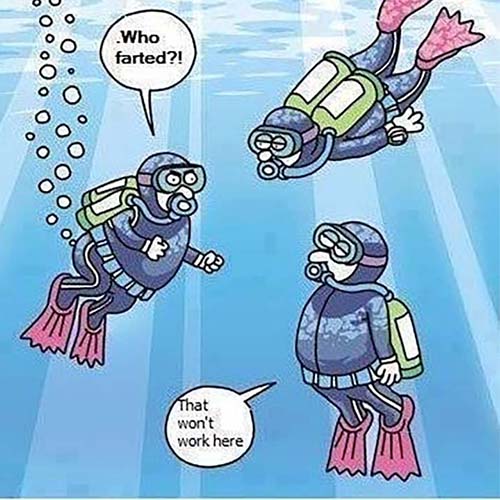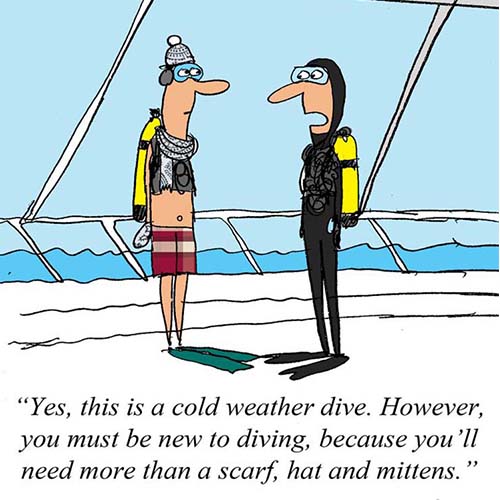Don’t be a Scuba Loser!
Oh, the life of a dive professional.
Living the dream, right? Hanging out on the beach. Diving in the ocean every day to experience the underwater world first hand. What could be more relaxing?
Admittedly we do have our moments. Meeting new holiday makers regularly and taking people diving is a great way to make a living and helping people to get better at their hobby is the most rewarding part. Many of our customers here in Nusa Lembongan come to try snorkeling or diving for the first time. After their first taste of all things underwatery they get hooked, no pun intended, and sign up for a PADI course to continue their aquatic adventures. Even the experienced divers that come to visit, regularly stay an extra day or two because of the, “I want to see more” factor. We have noticed over the years that most of our divers have one thing in common. They ask us how they can improve their diving techniques and abilities.
Now we love our underwater time here at Siren Diving and we know that you do too. This is why we’re sharing with you our Top 10 things that we think all divers should know. Some may seem funny and some a bit silly but all of them will help to improve your diving experience… and probably your dive guides experience too 😉
1. Know how to clear a flooded mask
It goes without saying that every diver should be comfortable getting water out of their mask while on a dive. But just how comfortable are you?
Ever ended up at the surface every time you clear a mask, because you keep kicking? Do you try to prevent water entering your mask by having it so tight your eyeballs are touching the glass?
Maybe you need a little practice. It’s nothing to be ashamed of, especially if it’s been some time since you have been in the water. Ask your guide to support you while you refresh your skills in shallow water.

2. Don’t pee in your wetsuit
There’s an old joke about there being 2 types of diver; Those that pee in their wetsuit and those that lie about it. But seriously people, why would you want to?
In reality, peeing in your wetsuit damages the neoprene, can give you nappy rash, and makes you colder than if you hadn’t. Don’t believe me? It’s true! If you pee in your suit, the warmth stimulates blood flow to the skin surface. So yes, you get warm for about 30 seconds. BUT, once the water in the suit starts to cool again, there is more of your blood exposed to the lower temperatures so you chill down much quicker than if you had tied a knot in it.
Still not convinced… Well, no one may have told you this before but you smell… bad :p

3. You can go diving when it’s raining
It may seem crazy to some people but it doesn’t matter if it’s sunshine, raining or even snowing… you CAN go diving.
Depending on where you are diving it may affect visibility in the water a little but it’s not like you’re going to get any wetter 😉

4. Neutral buoyancy
If you’ve come up from a dive but your computer says you’ve done 3, you need to practice your hovering my friend.
Being neutrally buoyant in the water is not just an “option”, it’s essential for the safety of the reef, your buddy and yourself. Take the time at the start of your dive to make sure you have the correct amount of weights and they are distributed correctly around your body. Your guide certainly won’t mind, and you’ll have a much better experience.

5. The inverse law of “ability verses equipment”
If you have more spiky bits coming off you than a satellite when entering the water, you may be suffering from, “All the gear, no idea” syndrome.
Sure, it’s good practice to have a safety marker and a signaling device with you on any dive but there are physical limits to what one person can carry underwater and remain streamlined and efficient. Your local guide can help you with any questions you may have about usable equipment for any given dive site.

6. No fish fiddling
Touching aquatic life is bad. Let me say that again as it’s so important that we want to make sure you read it the first time… Touching aquatic life is BAD.
Whether it’s a majestic looking Manta Ray or an innocent, (but incredibly poisonous), Conch shell. If you don’t know what you are doing, you can hurt the underwater life or cause yourself a serious injury or worse. The guides that you dive with are familiar with the life in the area and can shed light on any potential hazards you may come across so please, listen to the briefing and don’t be a fish fiddler!

7. Don’t take up diving to get a suntan
Suntan lotion is a good thing. It protects our skin from the tropical rays and allows us to stay in the sun longer. However, it also damages neoprene and stings like crazy if it gets in your eyes!
If you’re wearing a full-length wetsuit whilst diving, there’s little point in smearing a gallon of the stuff all over your body and looking like an entrant for a jelly wrestling contest. If you are in a shorty, then lube up the exposed bits but avoid putting any where your mask sits for at least 20 minutes before your dive. This will help you to avoid those unsightly tan lines on your new profile pictures.

8. Batteries not included
Asking on the boat, if anyone has a GoPro charger, is a little too late in most circumstances.
Cameras, dive torches, phones and dive computers all require power while on the surface or underwater. If you forget to charge your device then don’t worry about it. For sure, you’ll see a Whale Shark or something else incredible and have no record of it but enjoy the experience regardless.

9. It’s OK to be nervous or scared but know your limits
An adrenalin rush is a great thing but it can turn to fear if you let it go too far.
If you are feeling nervous or anxious about a dive, then tell someone about it. You may find that your fears are unfounded or that simply talking about them eases the stress. In any case, always take the opportunity to tell your dive leader if you are not comfortable BEFORE the dive starts so they can help you enjoy your dive to the fullest.

10. Zips on wetsuits are there for a reason
If your suit has zips on the ankles or sleeves, remembering to unzip them before you try to remove it will stop you flapping your arms and legs around like an epileptic spider.
Wetsuits have come a long way in the last few years. Modern materials and synthetic fabrics make your favorite rubber suit more comfortable than ever before but they do need a little care. Remembering to unzip will make the whole removal process much easier and increase the life of your suit.

So there you have it. Our top 10, not exhaustive, list of things that every diver should know.
Hope you found the above useful, interesting or at least vaguely amusing and remember…
No-one wants to be a SCUBA Loser!
